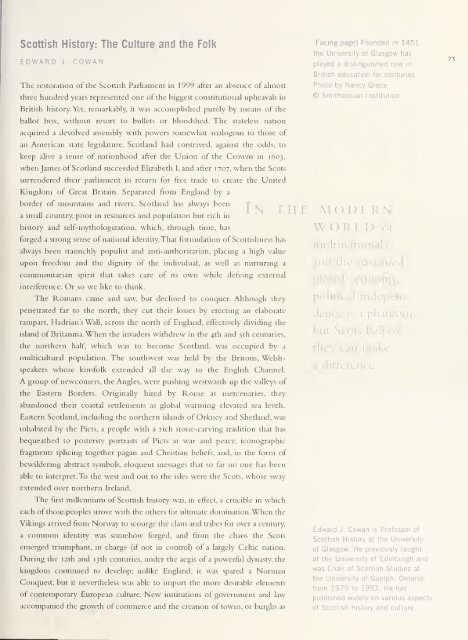SCOTLAND - Smithsonian Digital Repository - Smithsonian Institution
SCOTLAND - Smithsonian Digital Repository - Smithsonian Institution
SCOTLAND - Smithsonian Digital Repository - Smithsonian Institution
You also want an ePaper? Increase the reach of your titles
YUMPU automatically turns print PDFs into web optimized ePapers that Google loves.
Scottish History: The Culture and the Folk<br />
EDWARD J. COWAN<br />
The restoration of the Scottish Parliament in 1999 after an absence of almost<br />
three hundred years represented one of the biggest constitutional upheavals in<br />
British history. Yet. remarkably, it was accomplished purely by means of the<br />
ballot box, without resort to bullets or bloodshed. The stateless nation<br />
(Facing page) Founded in 1451,<br />
the University of Glasgow has<br />
played a distinguished role<br />
British education for centuries.<br />
Photo by Nancy Groce<br />
© <strong>Smithsonian</strong> <strong>Institution</strong><br />
in<br />
73<br />
acquired a<br />
devolved assembly with powers somewhat analogous to those of<br />
an American state legislature. Scotland had contrived, against the odds, to<br />
keep alive a sense of nationhood after the Union of the Crowns in 1603,<br />
when James of Scotland succeeded Elizabeth I, and after<br />
1707, when the Scots<br />
surrendered their parliament in return for free trade to create the United<br />
Kingdom of Great Britain. Separated from England by a<br />
border of mountains and rivers, Scotland has always been<br />
a small country, poor in resources and population but rich in<br />
history<br />
and self-mythologization, which, through time, has<br />
IN<br />
forged a strong sense of national identity. That formulation of Scottishness has<br />
always been staunchly populist and anti-authoritarian, placing a<br />
high value<br />
upon freedom and the dignity of the individual, as well as nurturing a<br />
communitarian spirit that takes care of its own whOe defying external<br />
interference. Or so we like to think.<br />
The Romans came and saw, but declined to conquer. Although they<br />
penetrated far to the north, they cut their losses by erecting an elaborate<br />
rampart, Hadrian's Wall, across the north of England, effectively dividing the<br />
island of Britannia. When the invaders withdrew in the 4th and 5th centuries,<br />
the northern halt, which was to become Scotland, was occupied by a<br />
multicultural population. The southwest was held by the Britons, Welshspeakers<br />
whose kinsfolk extended all the way to the English Channel.<br />
A group of newcomers, the Angles, were pushing westwards up the valleys of<br />
THE<br />
MODERN<br />
WORLD of<br />
multinationals<br />
and the so-called<br />
global economy,<br />
political independence<br />
is<br />
a phantom,<br />
but Scots believe<br />
they can inake<br />
n<br />
difference.<br />
the Eastern Borders. Originally hired by Rome as mercenaries, they<br />
abandoned their coastal settlements as global warming elevated sea levels.<br />
Eastern Scotland, including the northern islands of Orkney and Shetland, was<br />
inhabited by the Picts, a<br />
people with a rich stone-carving tradition that has<br />
bequeathed to posterity portraits of Picts at war and peace, iconographic<br />
fragments splicing together pagan and Christian beliefs, and, in the form of<br />
bewildering abstract symbols, eloquent messages that so far no one has been<br />
able to interpret. To the west and out to the isles<br />
were the Scots, whose sway<br />
extended over northern Ireland.<br />
The first millennium of Scottish history was, in effect, a crucible in which<br />
each of those peoples strove with the others for ultimate domination. When the<br />
Vikings arrived firom Norway to scourge the clans and tribes for over a century,<br />
a common identity was somehow forged, and from the chaos the Scots<br />
emerged triumphant, in charge (if not in control) of a largely Celtic nation.<br />
During the 12th and 13th centuries, under the aegis of a powerful dynasty, the<br />
kingdom continued to develop; unlike England, it was spared a Norman<br />
Conquest, but it nevertheless was able to import the more desirable elements<br />
of contemporary European culture. New institutions of government and law<br />
accompanied the growth of commerce and the creation of towns, or burghs as<br />
Edward J. Cowan Is Professor of<br />
Scottish History at the University<br />
of Glasgow. He previously taught<br />
at the University of Edinburgh and<br />
was Chair of Scottish Studies at<br />
the University of Guelph, Ontario,<br />
from 1979 to 1993. He has<br />
published widely on various aspects<br />
of Scottish history and culture.
















